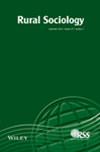Securing a Future in Nonmetropolitan Areas: Community and Family Influences on Young Adults' Intentions to Stay for Employment☆
IF 1.9
3区 社会学
Q2 SOCIOLOGY
引用次数: 0
Abstract
This study examines how community perceptions, family‐related factors, and other psychosocial factors collectively shape young adults' intentions to stay in their nonmetropolitan communities for employment. Research on nonmetropolitan populations' intentions to stay has increasingly highlighted community factors, including perceptions of the community and social connections. However, perceptions of the community have often been studied linearly and researchers have overlooked the multidimensional nature of employment decisions. Thus, this study conducted a latent profile analysis of 513 nonmetropolitan young adults and identified four distinct profiles:确保在非大都市地区的未来:社区和家庭对年轻人就业意愿的影响
本研究考察了社区观念、家庭相关因素和其他社会心理因素如何共同影响年轻人留在非大都市社区就业的意愿。关于非大都市人口的居住意愿的研究越来越强调社区因素,包括对社区和社会关系的看法。然而,对社区的看法往往是线性研究,研究人员忽视了就业决策的多维性质。因此,本研究对513名非大都市年轻人进行了潜在特征分析,并确定了四种不同的特征:对社会和职业特征的积极看法(38.79%),对整体社区特征的积极看法(35.28%),对长期生活规划特征的积极看法(15.79%),以及对整体社区特征的消极看法(10.14%)。通径分析表明,在非大都市社区,以对家庭友好和享受活跃的社交和职业生活的更积极的看法为特征的社区感知概况与获得或保留当地就业的更大意愿相关。这些发现是由社区和组织中的嵌入性影响介导的。家庭支持在求职者留下就业的意向中也起着至关重要的作用。他们也重视自己的看法,即留在非大都市组织的障碍更少。这些发现为吸引和留住年轻的非大都市工人提供了政策启示,使他们的愿望与社区、工作和社会特征保持一致。
本文章由计算机程序翻译,如有差异,请以英文原文为准。
求助全文
约1分钟内获得全文
求助全文
来源期刊

RURAL SOCIOLOGY
SOCIOLOGY-
CiteScore
4.60
自引率
13.00%
发文量
47
期刊介绍:
A forum for cutting-edge research, Rural Sociology explores sociological and interdisciplinary approaches to emerging social issues and new approaches to recurring social issues affecting rural people and places. The journal is particularly interested in advancing sociological theory and welcomes the use of a wide range of social science methodologies. Manuscripts that use a sociological perspective to address the effects of local and global systems on rural people and places, rural community revitalization, rural demographic changes, rural poverty, natural resource allocations, the environment, food and agricultural systems, and related topics from all regions of the world are welcome. Rural Sociology also accepts papers that significantly advance the measurement of key sociological concepts or provide well-documented critical analysis of one or more theories as these measures and analyses are related to rural sociology.
 求助内容:
求助内容: 应助结果提醒方式:
应助结果提醒方式:


